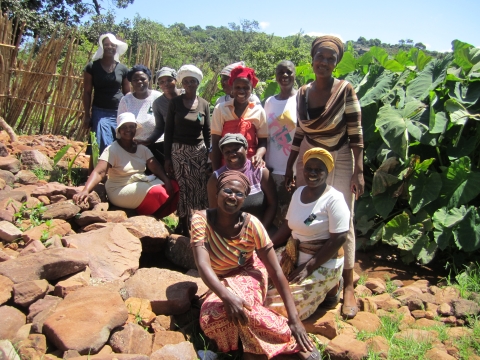
Nearly a dozen volunteers comprise the unofficial "Women of Sheshe Springs." (Photo by Brenda Wilson)
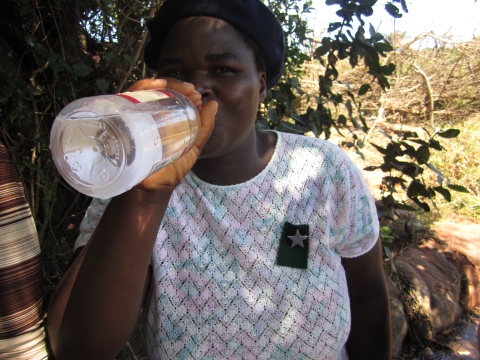
Cleaning the stream is hard, hot work, so the women bring bottles to fill with the clear, refreshing water. (Photo by Brenda Wilson)

This borehole is designed to extract underground water and funnel it to a stream near Sheshe, but it often gets clogged or breaks down, and repairs can take months. (Photo by Brenda Wilson)
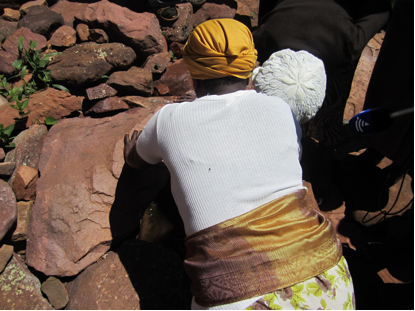
Shibu records the sounds of the women working to clear the stream. (Photo by Brenda Wilson)
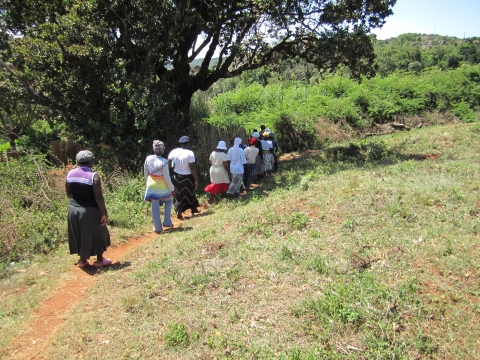
The women of Sheshe head downhill toward the stream, to begin their work clearing it of leaves and other debris so their village has access to clean drinking water. (Photo by Brenda Willson)
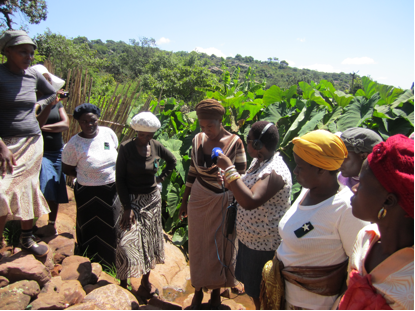
Shibu (with microphone) interviews the women who voluntarily clean the springs in Sheshe village. (Photo by Brenda Wilson)
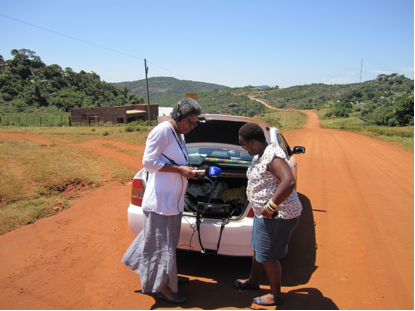
Knight Fellow Brenda Wilson (left) and SABC reporter Shibu Mamokgere examine their radio gear en route to Sheshe village. (Photo by Shadrack Letsoale)
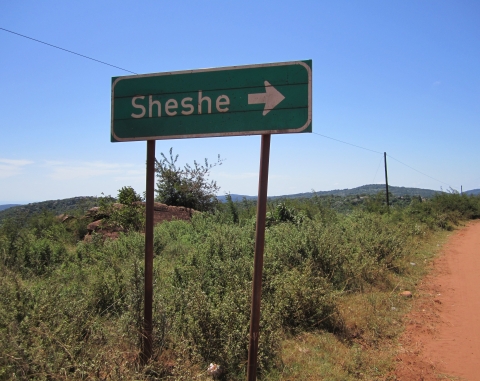
Sheshe village is in Limpopo province in the northern part of South Africa, near the Tropic of Capricorn. (Photo by Brenda Wilson)
It was with a bit of misgiving that I recently headed to Limpopo province to work with reporters at the South African Broadcasting Corporation’s regional station. The national office back in Johannesburg was hankering for stories about ordinary people amid constant unrest. The idea was to get reporters out of the main city, Polokwane, and into the field, fields being quite literal since Limpopo is 90% rural and one of the poorest provinces in South Africa.
Polokwane, however, has been a cauldron of political activity – at times, that can be taken literally. It’s the home of the ruling party, the ANC’s most infamous and unrepentant rebel and political activist, Julius Malema, the president of the ANC's Youth League. He has now been suspended from the party for calling President Zuma “a dictator.” The locals have periodically held mock funerals for Malema and burned images of him for bringing the province into ill favor with the national government.
The local premier sided with Malema in an intra party squabble, and the province is under the South African government’s administrative control, having come up short by more than 3 billion rand, roughly $380 million USD – the result, the national government determined, of mismanagement and corruption.
Human interest stories about health, even as nurses go on strike and hospitals run short on food and medicines, are not high on the list of reporters. Health workers and hospital staff in the employ of the government aren’t talking anyway.
There have been a series of eruptions, civic unrest around protests against the lack of services and the wretched conditions in which the poor live – without water, electricity, sanitation and proper housing – conditions that persist in a political climate that threatens to derail progress.
Still, I insisted that with nine reporters in the newsroom, someone can be spared to cover conditions of everyday people while all of this is going on. SABC News reporter Shibu Mamokgere waved a press release in front of me about a group of women in the Vhembe district taking matters in hand when faced with a near constant shortage of drinking water.
The women of Sheshe village decided to clean two natural springs in the mountainous rural area where they live. The news release was from the Water Affairs Department’s Adopt-a-River project that encouraged people to clean up rivers and protect water sources from pollution. Off we went.
I had a relatively simple objective in this assignment – to show reporters how to bring stories to life with the natural sounds that are a part of a story; to record interviews and collect audio that is not distorted, and therefore practically incomprehensible; and to incorporate that sound into telling the story.
The assignment served as instruction for me as well, in what reporters in Limpopo and similar rural areas usually have to go through, the distances and hours they travel for stories, with the people on the news desk at the national office clamoring for them to file in an hour. They may be confronted with the prospect that worried Mamokgere – not understanding the language. There are eleven official languages in South Africa, and even when reporters speak a language, they can’t always be sure they speak a version the reporter is familiar with.
We made two stops to pick up hitchhikers to help find the village and two phone calls when a fork in the road proved challenging. About two-and-a-half hours after we set out, we arrived in Sheshe, a village at the end of a dusty road, where few homes have electricity, and most men leave to find work. Violet Munyai and ten other women volunteers for the project were waiting for us.
It was time to repeat Lesson One: Always check equipment and be prepared to roll when you hit the ground. Though I insisted Mamokgere check equipment before leaving the Polokwane newsroom, she hadn’t changed the batteries in the new Marantz she’d been assigned. So Violet Munyai and the women of Sheshe waited patiently to show us the results of their hard work.
The women explained that there was no work in the village. They were all unemployed. They got the idea of cleaning the springs, which had previously been used just to wash clothes, because the village borehole provided by the municipality broke down regularly. Waiting for it to be repaired, one local gentleman told us, could take months, and the villagers would have to travel long distances or wait for the water trucks.
Their efforts to keep the spring clean were largely unappreciated by other villagers, the women explained, but in the end may pay off. The Vhembe District has promised to help the women bottle the water and sell it.
A simple story perhaps, but one well suited for showing how radio can bring people and places to life. Mamokgere said she probably would have just gone out and interviewed the organizer. It hadn’t occurred to her to record the sound of the cattle bells, the chorus of angry women’s voices as they knelt to remove rocks and leaves that had been dropped or fallen into the springs.
Putting the story together back at the office that same evening, writing, editing and setting up the audio she had gathered, was more than a simple cut and paste job, and probably more work than Mamokgere had bargained for, but she was more than pleased with the end product.
Far from the constant conflict, in a quiet village, we found a story of how people keep it together when the rest of the world seems to be falling apart, which is what the people back in Johannesburg got to hear.